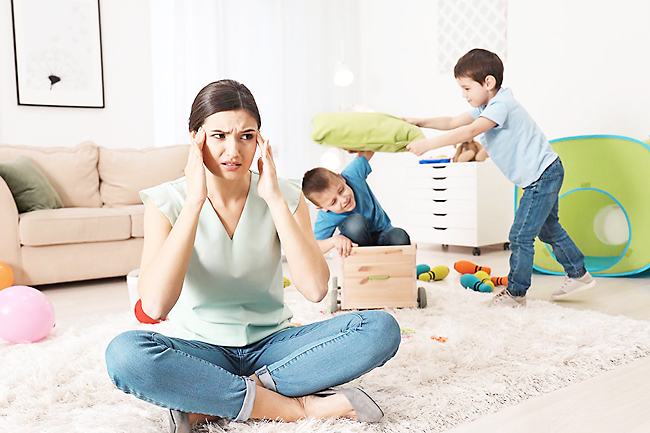Meghan Leahy
THE WASHINGTON POST – Mother of three daughters and the author of Parenting Outside the Lines Meghan Leahy answers a question from the mother of a very disorganised teenage girl. Meghan holds a bachelor’s degree in English and secondary education and a master’s degree in school counselling and is a certified parent coach.
QUESTION: My toddler turned two a couple of months ago, and he won’t listen to anything I ask him to do. I haven’t yelled at him or forced him into doing anything, except maybe cutting his nails and taking medicine when he’s sick. I have always used logic and reasoning, and I love to help him along the way. However, I’m beginning to worry that he thinks I am very mild and that I’ll change my mind if he throws a bigger tantrum, cries more or always says no.
He is now rejecting food because of his newfound sense of self, which I respect, but I worry whether I’m letting the reins out of my hands. He’s a great child: loving and sensitive, curious and bubbly. I don’t want to hamper his spirit, but I’m the parent, and I have responsibilities to teach him things, such as eating meals at the table. For two months, he has not eaten a decent meal at the table. I’m confused, lost and upset.
ANSWER: Congrats on having a two-year-old. It’s definitely like a Charles Dickens novel: the best of times, the worst of times. Just as you noted, typical two-year-olds are loving, sensitive, curious and bubbly. It can also feel as if they’re tyrannical, defiant and bossy. It’s normal to feel your authority being called into question when parenting a two-year-old. The truth is that this is the first of many instances where you will be called to make some new decisions in your parenting life. Unlike the old ways of parenting (we do what our parents did, which is what their parents did, etc), we get to learn about our two-year-olds and choose the best ways to parent our children.
A little Toddler Theory 101: First, our deepest need is to belong, and two-year-olds are still utterly attached to their caregivers. Your son takes all of his cues from you, and he is very attuned to your mood, facial expressions, tone of voice and even how you carry your body. Don’t feel pressured by this; just know that it lets you off the hook for the chronic need to talk, talk, talk.

Second, a two-year-old is starting to individuate, meaning he’s finding his own mind and owning his body. This is exciting and tiring parenting work, because your son’s ability to use logic and reason is still not online consistently, so you are chronically parenting a little soul who is either quite happy or quite sad.
Two-year-olds don’t have the ability to take on other people’s perspectives, so yes, it’s what he wants, the way he wants it. This can feel manipulative, but your son doesn’t have the ability to manipulate you. He is just a little ball of willfulness, and it will pass.
We know he is where he should be. But what should you do? Follow his whims and fulfill his wishes? Yes and no. The first thing, whether it’s about eating, dressing or something else, is to write down and repeat this mantra: His behaviour isn’t personal. He is not purposely trying to make you mad or be “bad”; he is growing. When we see that he is little and growing up, we can take a less “him vs me” stance, and more of a “how can I help him develop” stance. As much as possible, don’t get into power struggles with your son. You will never win, and everyone will be in tears. (His bad behaviours will also grow more than you would like.)
What can you do? Reach out to other toddler parents. Normalising your struggles is an important part of parenting, and you will feel much better. Next, understand that holding boundaries is an important part of parenting. This looks like keeping him safe from himself (he can’t run down the middle of the street or jump off the couch), and he will fight these boundaries. He will thrash, throw a tantrum, bite, kick and cry. Your job is to wait until that is over, then move on. No logic, no discussion. Just a no, and hold on to it.
As for the three horsemen of the parenting apocalypse (eating, toileting and sleeping), there isn’t much you can do that doesn’t turn into abuse (at worst) or spinning your wheels (at best). Give him his food, eat with him, and smile and chat, and when he gets up or throws his food, the meal is over. Don’t talk about it or shame him or remind him. Just move on. If he wants to graze, say: “Lunch is over, but we’ll eat again soon!” He may not like that, but that’s OK. The boundaries are doing the teaching. You can’t reason or discuss logic with a toddler.
Loving and holding boundaries with your toddler is tiring work, and we were never meant to do this alone. Find support in whatever way you need it. Get assistance from a mother’s helper, sitter or family member, and be sure to take breaks from your son, so when you see him, you can feel the love and compassion for him that you so badly want to feel.
This is the age where good books can go a long way in helping you understand him. Go to your local library or bookstore, peruse the books and take some time to see what feels right to you. Basic development books are always a good start, and any book that helps you keep a sense of humour will also go a long way. Good luck!


















































